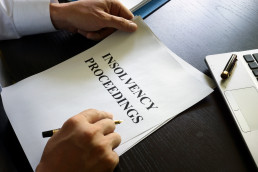Facing the reality that your business may be insolvent does not mean you cannot restructure or turn things around. Call our qualified insolvency practitioners at Berley to discuss your options.
With over 17,000 companies facing insolvency each year in England and Wales, knowing when to get the right support can make all the difference between protecting your investments or incurring a further loss. This is where Berley steps in. Talk to one of our insolvency practitioners today about your situation.
The sooner you get help, the higher your chance of a better outcome
There’s a truth to companies tending to go through ebbs and flows but many small businesses don’t even last long enough to see that happen. Approximately 20% of new business fail within just one year of operation, while 60% end up shuttered within three years. This can seem excessive but, upon closer inspection, you can start to see why many of these businesses have failed.
Many small business owners, especially those who are new to business ownership, are very talented but it’s not uncommon to find that they don’t have all the tools, data or understanding to make their business a true success. This is almost an inevitability. Running a small business means that you have a lot of responsibilities and having everything in place just isn’t possible. Because of all of this, it can be difficult for small business owners to recognise that help is needed- especially if they take great pride in their independence.
Instead of looking to these failings more objectively as a problem with the business, it’s instead common for small business owners to pull everything inwards and blame themselves for the problems. Such failure often feels very personal and this can be a huge barrier to getting help. Nevertheless, it is important that you do so and recognise when your business is becoming insolvent.
Five signs that your business is facing insolvency
Learning when to spot when your business is hurtling towards insolvency is an incredibly important step in giving your business every chance of surviving. There are a number of signs that indicate that your business may soon be, or is, experiencing insolvency. Here are five of those most common signs:
No cash
A failure to pay day-to-day running costs is a clear sign of insolvency. This may be paired with sales having decreased over a period of time. Even if your business is performing well, the amount you spend on expenditure or improper accountancy may be causing the issue. If you find that you’re not only selling off business assets but personal assets, then this is the clearest sign that you are heading to insolvency without proper intervention.
Creditor issues
When you’re finding that you’re getting regular calls and letters regarding the finances of your business – from HMRC, banks, suppliers, credit card suppliers and other creditors – you’re on course to receive a winding-up order. If you’re in this position, it’s important to get in touch with an insolvency practitioner right away – especially if a creditor or supplier/buyer is threatening you with legal action.
No more credit
This occurs when you’re finding that you are unable to loan any more money or when you reach credit limits with suppliers. This is something that can happen to a lot of newer start-ups in particular when any initial cash dries up or they have relied too heavily on the leasing of assets as opposed to asset ownership. It’s important to identify what is stopping you from securing additional financing before it leads to your business running out of options.
Losing key clients
If you’re finding that you can’t retain clients, or that your previously loyal clients are leaving you, then that could be an early sign that your business is in trouble. It could be market conditions, competitor intervention, customer service problems, product/service issues or other reasons that have cast your company in less favourable light.
Unpaid wages
When staff (including company directors) are not being paid on time, this is a sign of impending insolvency. This not only causes financial strain, but can seriously hamper staff morale which can lead to even further losses and repercussions.
These are just some of the signs that your business is heading towards insolvency, if it isn’t already there.
Have you seen these signs within your company? Or any other worrying trends? If so, it’s important to talk to a qualified, licensed and experienced insolvency practitioner. To do so, call us on 020 7636 9094 and we’ll discuss the options available to you and your business, as well as conducting a solvency review.
Aside from being insolvency practitioners, we’re qualified accountants with specialisation in small businesses. National and global events, particularly those in 2020, showed us how important it is to have robust accountancy on your side at a time when every penny counts.
We want you to be informed with the fullest facts possible so that you can make the best decisions for you, your company and your company’s future – including how to best proceed and how to protect your investments. While many small business owners can be afraid of the word ‘liquidation’, be assured that we will explore every possible option before we consider this extreme measure – including refinancing, restructuring, reaching an agreement with your creditors, or even selling off the company.
What is a solvency review?
In order to fully understand the risks facing your company, it’s important to know how solvent your business actually is today. Solvency refers to the ability of a person or company to cover their debts. In other words, it’s when someone has assets (company or personal) in excess of any outstanding liabilities.
Being able to show solvency is a key determiner of your company’s viability when it comes to either securing any further finance or when hashing out any deals with creditors. To do this, we’ll present written reports following conversations with any and all directors/shareholders, as well as a thorough review of company records and books. This is why it is so important to have such a robust examination of your business by an independent expert as soon as you spot any signs of decay in your company’s performance.
With new insolvency reforms in place from January 2021 that benefit small businesses with less than $1m in debt – making it simpler and more cost-effective to restructure a business while offering short-term protection from a number of creditors – there has never been a better time for a small business owner to get in touch with a qualified insolvency practitioner.
What are the consequences of insolvency?
As a company director, you have a responsibility to act responsibly and in the best interests of the company’s health and in the best interests of any creditors. As such, you cannot knowingly allow the company to keep trading or incur any further debts while insolvent as this could leave you personally liable for these debts.
Additionally, you are legally obliged to employ an insolvency practitioner to submit a report to the government’s Insolvency Service. If it has been discovered that your company has been trading while being insolvent, that you have preferred certain creditors over others, that your company has been selling assets for less than the market value, or that you have been taking a high salary when your company is in financial peril, you may be disqualified from being a company director for up to 15 years.
This is why it’s important to be proactive in contacting an insolvency practitioner as soon as you see warning signs within your company. The earlier you approach an insolvency professional, the better the chance of being able to rescue the company and navigate these legal duties. Get in touch with a qualified insolvency practitioner today by calling 020 7636 9094 or using our Online Enquiry form to receive your FREE consultation.
Company insolvency – what can I do as a director?
As a company director, you must ensure that you act in a responsible way and in the best interests of your creditors. This means you must not allow the company to continue trading and/or incur further debt. You should also take proactive steps to discuss the circumstances with a business insolvency professional.
If you seek help from an insolvency practitioner early, you stand a greater chance of saving your company. In this case, our insolvency practitioners seek to discuss the following with you:
A Company Voluntary Agreement (CVA)
In this process, if we are your appointed insolvency practitioners, we will work out an arrangement on how your company is going to repay its debts and when. This proposal usually provides a better option for your creditors than the company is immediately placed into liquidation. If 75% (by debt value) of the creditors agree, then the CVA is approved. As long as you continue to pay your debts as stipulated in the CVA, you will be safe from any pressure or legal action from your creditors.
Administration
In this instance, if we are your appointed insolvency practitioners, we will become the ‘administrator’ and your creditors cannot take legal action against your company to recover their debts or start compulsory liquidation without the permission of the court. In the meantime, we aim to:
- Restore the company’s viability
- Work out a CVA and seek approval from your creditors
- See if it feasible to sell the business
- Sell assets to pay preferential or secured creditors
Creditors’ voluntary liquidation
When a company can’t pay its debts and isn’t viable to a rescue plan, then it needs 75% (by value of shares) of shareholders agree to the winding-up. Once this happens, your insolvency practitioner will become a ‘liquidator’ to take charge of liquidating the company. In other words, they will oversee the process of winding-up and making sure that debts are settled in a fair and orderly manner.
Turnaround management
Transforming a financially-distressed company into a sustainable business requires new strategic and operational processes to control costs and improve profitability, often done through restructuring or making radical changes. Turnaround management takes time, effort, courage, as well as profound accounting knowledge from our chartered accountants.
Other options
Knowing other options like Administrative Receivership, Fixed Charge Receivership, Law of Property Act Receiverships, Compulsory Liquidations and their implications may help you to decide on your next cause of action.
Recent changes to insolvency guidelines
As aforementioned, there are now new guidelines in place that will benefit small businesses that are facing the prospect of insolvency. The Corporate Insolvency and Governance Act (CIGA) took effect on June 2020 and it particularly benefits smaller businesses – including new moratorium protections, defending companies going through rescue from termination clauses by suppliers, and temporary protections to those that suffered under the COVID-19 pandemic.
The moratorium is a positive step for small businesses struggling with debt as it gives a 20-business day ‘holiday’ (extendable to 40 days or beyond) for a rescue plan to be considered under the auspices of a licensed insolvency practitioner. This will pause most non-financed debt payments, legal/enforcement action by creditors or forfeiture proceedings from landlords during this period – allowing small business owners to temporarily focus on finding a way forward without external threats.
With these new measures in place, there is more incentive for small business owners to immediately seek out insolvency guidance to ensure that their companies are maximising their chances of survival.
Berley can help companies facing insolvency
Company insolvency happens more often than one would like to think and every situation has its own challenges. In fact, as of September 2020, the Office for National Statistics projected that 64% of all UK business were at risk of insolvency. Instead of procrastination, it requires action to resolve the problem. At this sensitive and stressful time, knowing who you can call to discuss the issue is key.
At Berley, our insolvency practitioners aren’t here to judge your circumstances. Rather, we are here to discuss your options professionally so you are clear about the next steps for you and your company. Once you have a plan of action in place, we will support you throughout the process.
Talk to your independent, licensed, experienced insolvency practitioners today by calling 020 7636 9094 for your FREE consultation.
Insolvency does not mean bankruptcy
As we have established, insolvency is not necessarily the end of your company – nor does it lead to bankruptcy. While this may happen in cases where you have provided personal guarantees to any loans obtained by your company, it also doesn’t mean that you can’t start afresh.
However, it’s important to seek advice as early as possible so you can explore all of the options to see if there is a chance of recovery before it’s too late. Talking with an insolvency practitioner as soon as possible affords you with flexibility to consider changes to your approach – giving you the knowledge and options to learn from your mistakes.
It can also provide you with the opportunity to launch a new company with new knowledge and possibilities that utilise ever-expanding technological developments – including digital, cloud-based and AI-driven solutions. This is possible if you act in good faith and contact an insolvency practitioner as soon as you are aware that your company is facing insolvency.
Remember: unlawful conduct can see you being disqualified from being able to be a company director from anywhere between 2 to 15 years. The risk of inaction is not worth damaging your future opportunities. Give yourself options and protect your interests by getting in touch with one of our licensed insolvency practitioners today on 020 7636 9094, by emailing info@berley.co.uk or completing our Online Enquiry. form.






